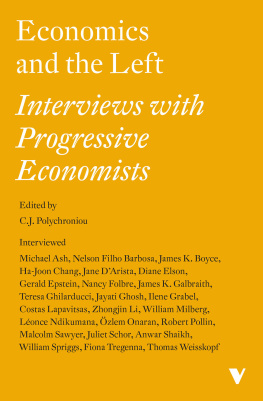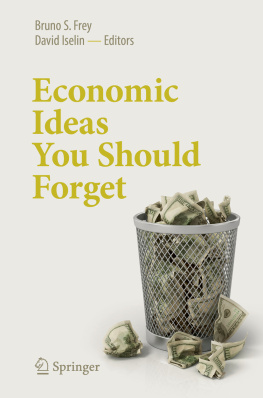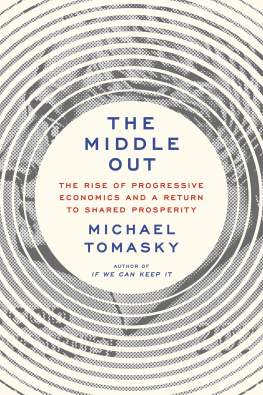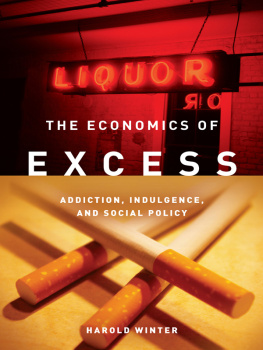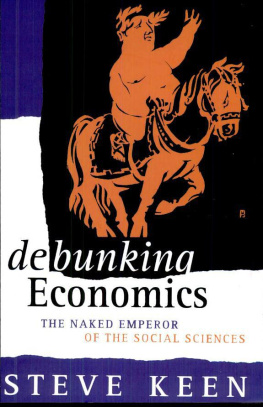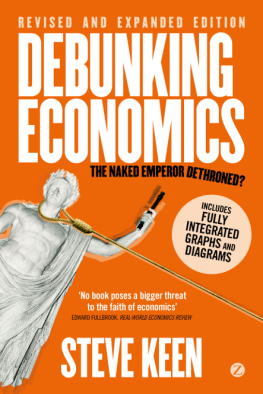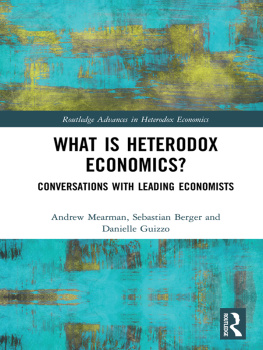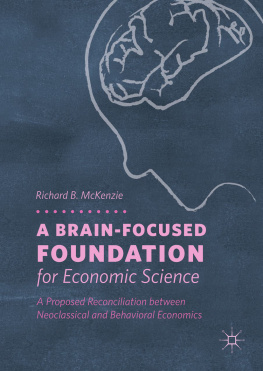C.J. Polychroniou - Economics and the Left: Interviews with Progressive Economists
Here you can read online C.J. Polychroniou - Economics and the Left: Interviews with Progressive Economists full text of the book (entire story) in english for free. Download pdf and epub, get meaning, cover and reviews about this ebook. publisher: Verso, genre: Politics. Description of the work, (preface) as well as reviews are available. Best literature library LitArk.com created for fans of good reading and offers a wide selection of genres:
Romance novel
Science fiction
Adventure
Detective
Science
History
Home and family
Prose
Art
Politics
Computer
Non-fiction
Religion
Business
Children
Humor
Choose a favorite category and find really read worthwhile books. Enjoy immersion in the world of imagination, feel the emotions of the characters or learn something new for yourself, make an fascinating discovery.
- Book:Economics and the Left: Interviews with Progressive Economists
- Author:
- Publisher:Verso
- Genre:
- Rating:3 / 5
- Favourites:Add to favourites
- Your mark:
- 60
- 1
- 2
- 3
- 4
- 5
Economics and the Left: Interviews with Progressive Economists: summary, description and annotation
We offer to read an annotation, description, summary or preface (depends on what the author of the book "Economics and the Left: Interviews with Progressive Economists" wrote himself). If you haven't found the necessary information about the book — write in the comments, we will try to find it.
Economics and the Left: Interviews with Progressive Economists — read online for free the complete book (whole text) full work
Below is the text of the book, divided by pages. System saving the place of the last page read, allows you to conveniently read the book "Economics and the Left: Interviews with Progressive Economists" online for free, without having to search again every time where you left off. Put a bookmark, and you can go to the page where you finished reading at any time.
Font size:
Interval:
Bookmark:
This eBook is licensed to Christia Shiloxys, christiashiloxys90@gmail.com on 11/16/2021
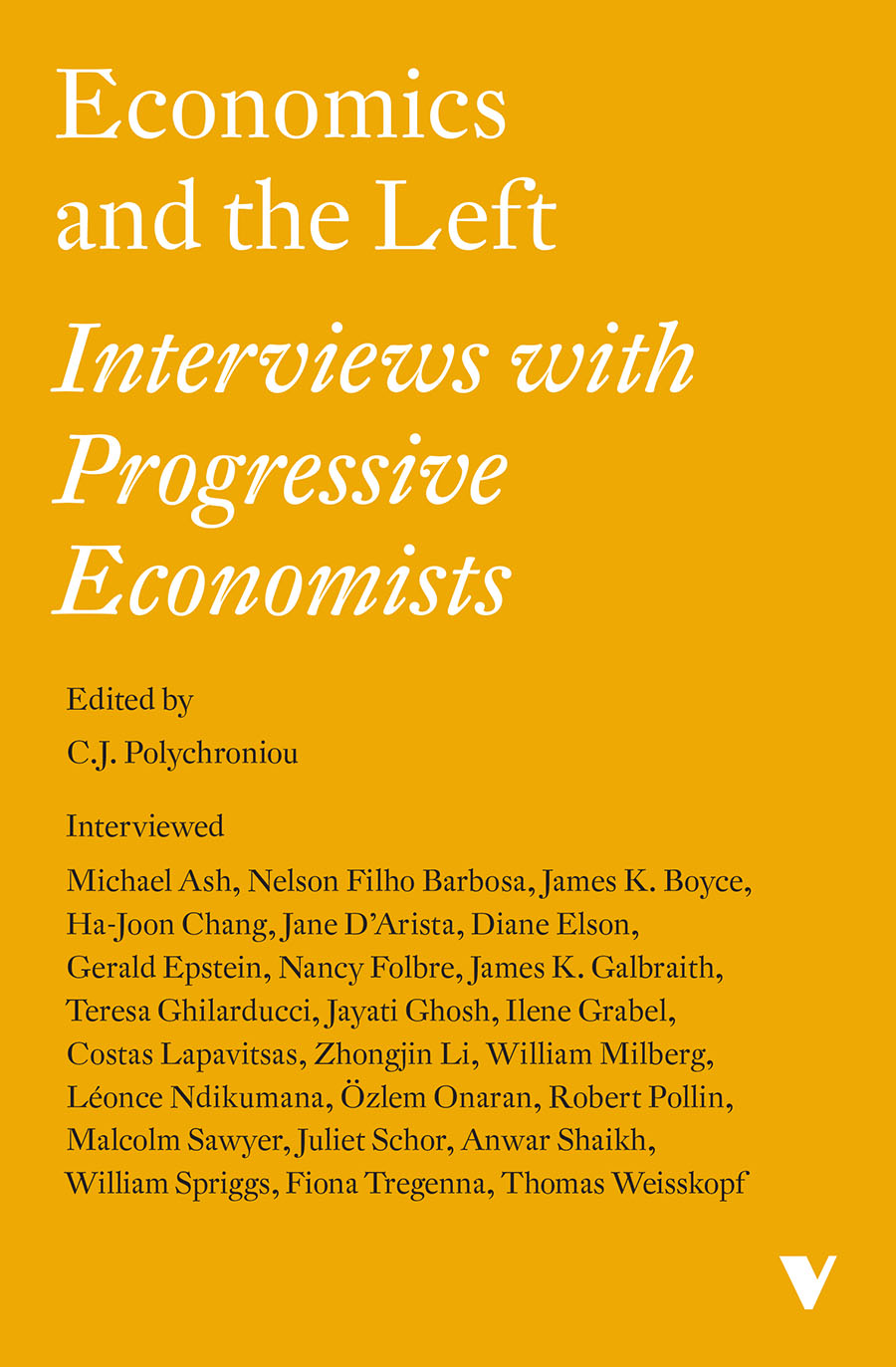
Economics and the Left
This eBook is licensed to Christia Shiloxys, christiashiloxys90@gmail.com on 11/16/2021
Economics and the Left
Interviews with Progressive Economists
Edited by C.J. Polychroniou
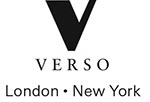
This eBook is licensed to Christia Shiloxys, christiashiloxys90@gmail.com on 11/16/2021
First published by Verso 2021
Verso Books 2021
All rights reserved
The moral rights of the authors and editors have been asserted
1 3 5 7 9 10 8 6 4 2
Verso
UK: 6 Meard Street, London W1F 0EG
US: 20 Jay Street, Suite 1010, Brooklyn, NY 11201
versobooks.com
Verso is the imprint of New Left Books
ISBN-13: 978-1-83976-379-3
ISBN-13: 978-1-83976-380-9 (UK EBK)
ISBN-13: 978-1-83976-381-7 (US EBK)
British Library Cataloguing in Publication Data
A catalogue record for this book is available from the British Library
Library of Congress Cataloging-in-Publication Data
Library of Congress Control Number: 2021937573
Typeset in Minion by Hewer Text UK Ltd, Edinburgh
Printed and bound by CPI Group (UK) Ltd, Croydon CR0 4YY
This eBook is licensed to Christia Shiloxys, christiashiloxys90@gmail.com on 11/16/2021
Contents
This eBook is licensed to Christia Shiloxys, christiashiloxys90@gmail.com on 11/16/2021
This book presents interviews with twenty-four economists whose life-work has been dedicated to both interpreting the world and changing it for the better. These twenty-four people all bring to their work a toolkit of technical skills of the trade. But much more importantly, they are all also people who are committed to the principles of egalitarianism, democracy, and ecological sanity. In various ways, they have all advanced their commitments through both their research work as economists and their engagements in areas of economic policy.
All twenty-four people I interviewed depart dramatically from the tenets of mainstream orthodox economics, even while they have all carved out their own approaches to research and policy interventions. Collectively, they have brought to the forefront issues of class conflict, racial and gender inequality, systemic financial instability, imperialism, the climate crisis, global inequality, poverty, and state-led developmental strategies in original and impactful ways.
These are all fundamental contributions to understanding the functioning, and malfunctioning, of capitalist economies and societies. This is true in general as well as, more specifically, over our current epoch of neoliberal capitalism, which began in the late 1970s and still prevails in all corners of the globe. Neoliberalism is the variant of capitalism in which the priorities and prerogatives of big corporations, Wall Street, and the richest 0.1 percent of the global population dominate all other considerations in the formation of economic and social policies.
It would not be fair to say that all mainstream economists have ignored such considerations altogether. It is, rather, the case that for the most part mainstream economists have either judged these issues to be of secondary importance or to be matters that can best be addressed within the framework of free-market capitalism. They reach this conclusion working from the precept that some close approximation to a free-market capitalist economy has been proven to deliver both higher living standards and more social justice than any alternative.
The twenty-four progressives I have interviewed are well aware of what they are up against in challenging economic orthodoxy. Many of them describe these challenges forcefully in their interviews. Joan Robinson, the renowned Cambridge University economist of the Great Depression and postWorld War II eras, beautifully captured both the allure and moral blindness of orthodox economics as follows:
One of the main effects (I will not say purposes) of orthodox traditional economics was a plan for explaining to the privileged class that their position was morally right and was necessary for the welfare of society. Even the poor were better off under the existing system than they would be under any other.
At the same time, it will quickly become evident to readers that these twenty-four interviewees are not cut from the same clothfar from it. They come from widely varying backgrounds as well as different generations. It is therefore not surprising that their respective work as progressive economists has proceeded along divergent paths. They have pursued different topics, have utilized different methods in advancing their research, and have aligned themselves with a range of progressive political movements. They also disagree with each other on many issues, large and small. As a result, these interviews are illuminating for their differences as well as their similarities.
The idea for this book emerged from what began as casual conversations I was having with Jerry Epstein and Bob Pollin, the founding co-directors of the Political Economy Research Institute (PERI) at the University of Massachusetts Amherst. Once we concluded that producing a book of interviews with progressive economists was a good idea, we then had to decide which economists to include in the project. It should not be surprising that PERI economists are heavily represented, including Jerry and Bob themselves, as well as seven others with formal PERI affiliations of some sort. The other fifteen interviewees are also people with whom Jerry and Bob, and others at PERI, have interacted in various ways over the years. In my view, there is a lot to be gained through hearing from a large number of additional progressive economists in similar interview formats. Indeed, I myself am regularly conducting interviews with many other such people, some with, and others without, PERI connections. Many of these interviews are being posted at the PERI website (www.peri.umass.edu/).
I conducted all the interviews with the same approach. That is, I sent out to everyone a specific set of questions and asked them to respond in writing. I edited their responses to a minimum extent only. The interviews vary in length because I encouraged everyone to answer as briefly or as extensively as they thought appropriate. In assembling the book, Ive presented the interviews in alphabetical order, since there did not seem to be any obviously better organizing approach.
In my clearly biased opinion, Economics and the Left is loaded with a fascinating mix of personal experiences, reflections on major historical events, and struggles with analytic approaches and research findings. What has emerged from this is a combustible brew of ideas and commitments from twenty-four progressive economists. Now it is up to you, the reader, to decide whether you agree with my assessment of what we have here.
Post-COVID-19 Addendum
I conducted the main body of these interviews over an extended stretch of time, from early 2018 until the spring of 2020. It was exactly when we thought we had finally completed the full set of interviews that the COVID-19 pandemic had begun to spread worldwide. It was clear at that point that we could not simply proceed with publishing the versions of the interviews that we had on hand. We rather needed to offer our contributors an opportunity to reflect, even if provisionally and briefly, on the global COVID pandemic.
Font size:
Interval:
Bookmark:
Similar books «Economics and the Left: Interviews with Progressive Economists»
Look at similar books to Economics and the Left: Interviews with Progressive Economists. We have selected literature similar in name and meaning in the hope of providing readers with more options to find new, interesting, not yet read works.
Discussion, reviews of the book Economics and the Left: Interviews with Progressive Economists and just readers' own opinions. Leave your comments, write what you think about the work, its meaning or the main characters. Specify what exactly you liked and what you didn't like, and why you think so.

